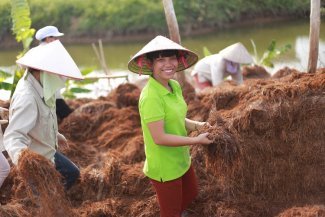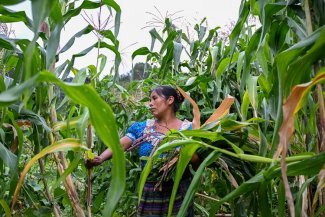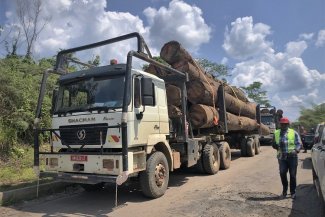From the town where he lives, 45-year-old forest warden José González can practically touch the clouds. Located roughly 3,000 metres above sea level, the village of 1,000 small houses is surrounded by corn and chilli plants, apple trees, giant pines and oaks.
José always wears boots and takes naps in his car with his cowboy hat over his face. He is originally from Topia, a small, hard-to-reach valley in the heart of the Sierra Madre in the northern Mexican state of Durango, near the Pacific coast. Durango is known for its rich deposits of gold and silver, as well as its abundant forests, which cover 87 per cent of the state’s territory.
Durango is a land of copious breakfasts, four-by-fours and unpaved roads that lead through its majestic forests filled with pumas, deer and wild boars. Wide trucks carrying timber and minerals wind around narrow mountain roads that jut out over the abyss. José was born in this mountain range, as was Pancho Villa, one of the icons of the Mexican Revolution. A natural paradise, Durango is also a land of extremes and inequality from which José wanted to flee as long as he can remember.
After turning 18, he did try to leave, attempting multiple times to cross into the United States. Each time, however, he was detained at the border and sent back to Mexico. Since he was a child, José had worked in the fields with his mother and, for a time, in the mines like his father. He worked hard and even took a chance on growing poppies (an illegal business that was flourishing between the US and Mexico at the beginning of the new century) in the steep mountains of his valley. José was finally able to save up enough money to cross the US border for good. He was one of many from his region to do so.

Forest warden José González in his valley in the mountains of Durango.
Poppy cultivation in Mexico continued to increase, reaching a peak of some 44,000 hectares cultivated nationwide in 2017. Then the price began to drop. “That’s why so few people plant it now. They go to work in the mines instead. This is a mining town,” adds José. Today, the total area of poppy cultivation in Mexico is estimated at 24,000 hectares, according to the United Nations Office on Drugs and Crime (UNODC). Many of those crops are concentrated right here on the steep slopes of the mountains where the states of Durango, Sinaloa and Chihuahua meet, an area known as the Golden Triangle. In some communities with no other sources of income, planting and harvesting poppy is the only economic activity.

Pancho Villa was born in this Sierra (mountain range). He would go on to become one of the icons of the Mexican Revolution when millions of peasants took up arms for the distribution of land in 1910, which, until that point was in the hands of a few wealthy people. This rugged paradise is dotted with thick pines, verdant ferns and orange mushrooms.
As is the case in many parts of the Americas, Durango’s natural riches have not benefitted the local population. As recently as the 1960s, illegal logging, encouraged by US companies in order to obtain Mexican hardwoods at low prices, had become such a problem that the government decreed a ban and set aside two million hectares of forest for protection. When the ban was later lifted, the government created a public company called Productos Forestales Mexicanos (PROFORMEX) which received the exclusive right to exploit Durango’s forest resources. But things didn’t work out so well.
According to activists, the public company lacked oversight and transparency. It ultimately became corrupt and consolidated a quasi-feudal regime. The company’s director lived in Mexico City and travelled to the area by private plane. He controlled not only the forest but also the roads, education, health services and even the food supply. The forest was plundered, and the population was powerless to stop it.
The lack of opportunities forced many people to abandon their communities to look for work in the United States. The result was a drain of talent, youth and strength, another form of extractivism. When José left for the United States, he didn’t think he would ever return. From the ages of 23 to 35 he worked countless jobs, including as a bricklayer in Las Vegas, a gardener in Los Angeles and a house painter in Tucson.

Topia is a small, difficult-to-access valley in the heart of the Sierra Madre (Mother mountain range) in northern Mexico, near the Pacific coast. Travelling 100 kilometres can take about four hours on the vertiginous routes.
This land of hospitable, self-sacrificing people was for a long time the stronghold of Chapo Guzmán, leader of the Sinaloa Cartel and Mexico’s main drug trafficker until his arrest in 2016. When former President Felipe Calderón (2006 to 2012) declared war on the cartels during his six-year term in office, Durango was one of the states most impacted by violence and insecurity.
In the meantime, people in Durango began to make some important changes. The members of the community who remained increasingly organised themselves into ejidos, a form of communal land ownership in Mexico that allows for cooperative use of forest and crops, while maintaining individual plots for inhabitants and a town centre. The right to use this land cannot be sold. Ejidos represent one of the best reforms to emerge from post-revolutionary 20th century Mexico.
The Mexican ejido system was inspired by the way of life of the region’s Indigenous peoples, though its legal form has undergone some changes. There are some 103 million hectares of ejido land in Mexico, representing 55 per cent of the total area of the country, according to the National Agrarian Registry (RAN).

The community sawmill of the Sezaric Group in Topia, Durango.
While José was painting the facades of houses in American suburbs, roughly 10,500 families in his valley, organised within the Unión de Ejidos y Comunidades Forestales General Emiliano Zapata (UNECOFAEZ), were working to change their present and future.
As meetings, assemblies and communication campaigns between ejidos increased, their hyperlocal form of diplomacy and politics began to have a greater and greater national impact. Men and women in boots and cowboy hats took on the PROFORMEX company, the government and illegal miners, and took over the management of a million hectares of forest land. They would go on to buy PROFORMEX’s wood processing plant and former plank factory.
And so the Grupo Silvindustria General Emiliano Zapata, a Rural Association of Collective Interest (ARIC) better known as Grupo Sezaric, was born. Today it provides direct and dignified work for 2,500 people in the area, with a board of directors that is accountable to ejidos like the one in Topia. Its furniture factory employs hundreds of workers and exports to other parts of Mexico. Sezaric has become the first company in the country to use the waste from its production (biomass) to generate electricity, which it uses and even sells.

Facilities of the Grupo Silvindustria General Emiliano Zapata, a Rural Association of Collective Interest, better known as Grupo Sezaric.
Karina Burciaga works here. The 24-year-old forestry engineer was born and raised on a local ranch two hours up the mountain from Santiago Papasquiaro, the departmental capital on the eastern slopes of the Sierra Madre.
“The best part is that I was able to study for a while in the city of Durango and then come back and work close to home and nature,” Karina explains. Other community enterprises that provide services to the industry have grown out of the group. These include the Unidad de Conservación y Desarrollo Forestal Integral Topia, where forestry engineers like Chea Soto provide technical advice to small-scale producers.

Most of these ejidos and communities earn their income by felling forest trees, allowing them to regenerate in planned intervals of 15, 40 and 90 years. People like Claro Oropesa continuously plant native seedlings. This ensures the sustainability of natural resources and the livelihoods of local residents, who are able to make a living working in the area’s traditional economic activities.

Claro Oropesa, a farmer from the valley of Topia, has been planting pine trees with care and love for over 40 years.
Community restructuring allowed ejidatarios to receive a fixed salary at the end of the year as a cooperative, which functions like a bonus. This has in turn allowed them to plan their economy in 15-year cycles. As part of this planning, members of the ejido had Topia internationally certified by a German-based non-governmental accreditation and certification organisation, the Forest Stewardship Council (FSC).

Grupo Sezaric has spawned other community-based companies that provide services to the timber industry.
An FSC certification guarantees that the wood and its derivatives products have all been obtained legally, sustainably and with respect for labour rights and the rights of local Indigenous communities. It has the strictest international standards of any certifying body as it does not depend on companies or governments. As Luis Alfonso Arguelles Suarez, FSC’s national representative in Mexico, explains, the Council is governed by three independent assembly chambers with equal voting weight.
José was in the United States when he received word of his mother’s death. He returned to Durango immediately and took care of her funeral arrangements. As an only child, he inherited the right to use her ejido. Upon returning home and to his roots, he saw the changes that had taken place: there was a new community sawmill operating in the area, he could choose from several nature-related jobs, he could be close to his family and childhood friends, and could once again look out over these mountainous landscapes and feel the cool, damp breeze of the forest.

José González has finally found happiness in his valley. Cooperative and sustainable work in nature has changed his life.
Planting maize on his land, as his mother did, and having access to the ejido cooperative changed José’s life for the better overnight. The fighting of Calderón’s “war on drugs” has subsided and along with it the violence. The community assembly voted for José to become a forest warden. He no longer wants to return to the United States.
“I had a lot of support in the assembly when I won, so I’ve put a lot of effort into this work so as not to disappoint. So far I’m doing very well, thank God. I have my radio with me and people let me know about any fires they see. I have very good contacts and we’re getting ahead. I’m happy here and I try to take care of the forest as much as possible. There’s been very few fires since I’ve been here. This year there hasn’t been a single one,” he says with a smile, sitting on a tree trunk in front of a wooden-walled grocery store, one of the few places in Topia that, in addition to soft drinks, beer and chips, sells the prepaid satellite cards that allow people here to connect to the internet for a short while, despite the mountainous terrain.
While the Topia Valley is a much more peaceful place today, open to nature tourism and with more jobs, the presence of army pick-up trucks with machine guns serves as a daily reminder that the conflict with drug traffickers continues to affect the area, as it does so many places in Latin America.
“The people are afraid because of what they are told, but it’s not as bad as all that. Here, when people have problems, they sort them out themselves, between one another. No one bothers us and no one steals anything here,” says José, adding that the wages are “not bad”. “And I have my corn, and that’s enough to buy a little truck and clothes for the kid,” he says. His salary is complemented by the money he receives for being part of the ejido, a total of 70,000 pesos a year, or around US$300 a month. This secure salary has allowed him to live well, “more comfortably than a miner,” he says.














